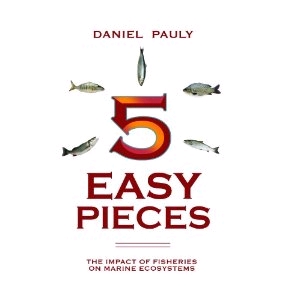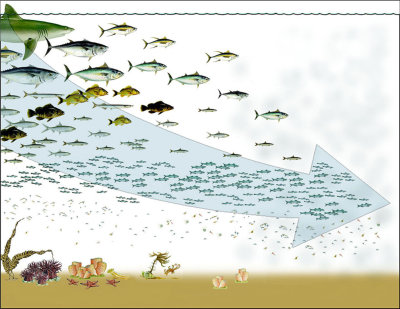Daniel Pauly, 2010. 5 Easy Pieces. The Impact of Fisheries on Marine Ecosystems. Washington, Covelo, London, Island Press, 193 p.
 This book narrates the stories behind five lighthouse publications by Daniel Pauly and his many collaborators, which epitomise his vast research and writings on the impact of fisheries on marine ecosystems. In doing so the grand master of fisheries science, as one colleague calls him, walks the reader in a wonderfully accessible way through some thirty years of advances in fisheries science so closely connected to his own work.
This book narrates the stories behind five lighthouse publications by Daniel Pauly and his many collaborators, which epitomise his vast research and writings on the impact of fisheries on marine ecosystems. In doing so the grand master of fisheries science, as one colleague calls him, walks the reader in a wonderfully accessible way through some thirty years of advances in fisheries science so closely connected to his own work.
With Daniel Pauly's good sense of humour and outstanding rigour in the science, we learn how his curious mind probed the extent to which fisheries was already using up the primary production of the oceans. Much to everybody's surprise already back in 1995, he and Villy Christensen showed in a now classical paper in Nature that exploitation rates in the most productive areas, continental shelves, were already between 25 and 35%, quite similar to human exploitation conditions on land.
In his possibly best-known publication, which appeared in Science in 1998, he coined the term 'fishing down marine food webs', a concept that has now become a household name not only in research circles, but also the wider public. The original research backed up by many other studies to teeth out doubts expressed about the concept and the way FAO fisheries landing statistics had been used to substantiate it led to much deeper understanding how all fisheries lead to fishing down the food web effects and sequential collapse unless they are kept under tight control. The pervasive effect has only become clear through the global analysis led by Daniel Pauly through the Sea Around Us Project supported by Pew Charitable Trust. Expansion of depleted fisheries into new areas or opening other fisheries deeper down and relying increasingly on highly variable small pelagics (Peruvian anchoveta, Chilean mackerel and other species often reduced to fish meal) had masked the effect even to many sector specialists looking at one species or region at a time.

While one resource assessment after the other in the 1980 and 1990s showed dramatic declines of valuable resources, fisheries production as reported by the Food and Agriculture Organization of the UN (FAO) continued showing increases. This mismatch between empirical observations and analyses by scientists and official record about the global food situation caught Daniel Pauly's attention and let him and Reg Watson to develop methodologies to assess the veracity of the FAO statistics.
They discovered massive overreporting by China, which, because of its size, distorted the global picture. For this they distributed global catches reported by FAO spatially as a function of biological requirements of the fishes and invertebrates making up the catches. This rules-based approach allowed already for allocating some 95% of the catches to a fine grid of half degree squares cast over the world's oceans. While this model based on depth, temperature, ice cover and other features truthfully predicted the marine areas of highest production, such as the Peruvian upwelling, it estimated 5.5 million tons of production for Chinese water, when the official reporting was almost twice as high.
The paper made understandable waves as many generalists and specialists alike rely on global trends reported by FAO for their perception of the overall investment and management requirements of the sector. The FAO and China have since been working on the problem, but the attention drawn by the paper was essential to rectify the erroneous perception of an annual increase of 0.3 million tons to one of actually 0.6 million decrease!
The review paper on what sustainability may mean for fisheries was published in Nature in 2002. It illustrated how fisheries had so far been characterised by sequential overfishing and collapse even before motorisation and industrialisation transformed fisheries on a global scale. The evidence is pointedly presented and makes stark reading. Pauly and co-authors call for nothing short of a radical shift from the rosy industry view towards drastic reduction of fishing capacity, subsidies and setting aside large swaths of the oceans as protected (no-fish) areas, particularly as previous natural refuges have become accessible to ever more sophisticated and powerful gears.
The fifth chapter looks towards the future of fisheries published in Science in 2003, not through the cristal ball, but rather by exploring different possible scenarios titled 'markets first' (where markets shape environmental policy, potentially also suppressing subsidies and outflagging on the cheap, though probably at a high environmental price), 'security first' (emphasis on conflicts driven by inequality between rich and poor), 'policy first' (balance social equity and environmental concerns), and finally 'sustainability first' (requiring change in value systems in favour of maintaining environmental integrity).
The title of the book is taken from the 1970 film starring Jack Nickolson 'Five easy pieces', directed by Bob Rafelsen to a script of award winning author Carole Eastman. The main character is introduced as an oil worker turning out half way to be an intellectual concert pianist. Perhaps this is an invitation to readers of this book to expect coming out as 'maritime philosophers.'
In short, it's an absolute must for anybody interested in the oceans, in environmental sustainability, marine fisheries, the people of the sea, and marine policy - or intent on thinking more deeply about the sea and our future.
Cornelia E. Nauen, August 2011








